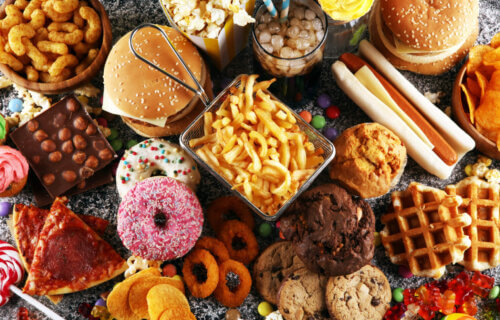PAMPLONA, Spain — When someone uses the term “processed foods,” you probably don’t think about anything healthy. When it comes to eating ultra-processed foods, a new study reveals these products may also be speeding up your biological clock. Researchers in Spain say consuming too much ultra-processed food (UPF) significantly increases the risk of premature aging. More specifically, these foods shorten the DNA markers which represent one’s biological age.
The study focuses on telomeres, structures made of DNA and specialized proteins found on the ends of chromosomes. Every human cell contains 23 pairs of chromosomes which hold our genetic code (hence the name of ancestry company 23 and me). Although telomeres don’t carry genetic information, the University of Navarra says they are vital to keeping your DNA and chromosomes stable.
As humans get older, these strands get shorter, making telomeres a key marker of our biological age. Researcher Lucia Alonso-Pedrero and her team find people who eat over three servings of UPF daily are twice as likely to have shorter telomeres.
“In this cross-sectional study of elderly Spanish subjects we showed a robust strong association between ultra-processed food consumption and telomere length,” study authors write in a media release.
What are ultra-processed foods?
The best way to describe UPFs are foods that don’t contain much actual food. The NOVA system, which the study uses to classify food, describes ultra-processed foods as “snacks, drinks, ready meals and many other products created mostly or entirely from substances extracted from foods or derived from food constituents with little if any intact food.”
Ultra-processed food products use industrial formulas of food substances, like oils and proteins, along with other cosmetic additives to create meals which are relatively ready-to-eat and don’t spoil quickly. It’s why these products are very convenient and attractive for shoppers, and make manufacturers lots of profit because of their low cost to produce.
Presenting their findings at the European and International Conference on Obesity, the Spanish team says UFPs also have links to serious conditions like hypertension, obesity, depression, type 2 diabetes, and multiple forms of cancer. These illnesses are often tied to effects of aging like inflammation and oxidative stress — things that impact telomere length.
How much do processed foods impact aging?
The study examines nearly 900 people (645 men and 241 women) with an average age just under 68. The participants then move into one of four groups, according to how many servings of ultra-processed foods they eat. The groups vary from under two daily servings (low), two to 2.5 servings, 2.5 to three servings, to eating over three UPF servings each day (high).
Researchers discover people in the “high” group are more likely to have family histories of heart disease, diabetes, and abnormal blood fats. These participants also tend to snack more in between meals and eat more fats, sodium, fast food, and processed meats.
The findings reveal the risk of telomere length getting shorter increases dramatically as consumers eat more UPF. The risk of shorter telomeres increases by 29 percent in the 2 to 2.5 serving group and 40 percent in the 2.5 to 3 serving group. That number jumps to a staggering 82 percent for those in the “high” UPF-eating group.
The report also finds eating more UPF has links to depression, especially for people who are not physically active. Ultra-processed foods may also contribute to higher risks for high blood pressure, obesity, and premature death.
The study also appears in the American Journal of Clinical Nutrition.
Like studies? Follow us on Facebook!

We have already known about bad effects of ultra processed foods.
However, once we get used to them , we rarely cook meals from raw materials or unprocessed foods. This article shows this is not the problem of ultra processed foods but that of our eating habit or lifestyle.
Eating is one of our fundamental activities. We must rethink of our eating habit and the content of our meals.